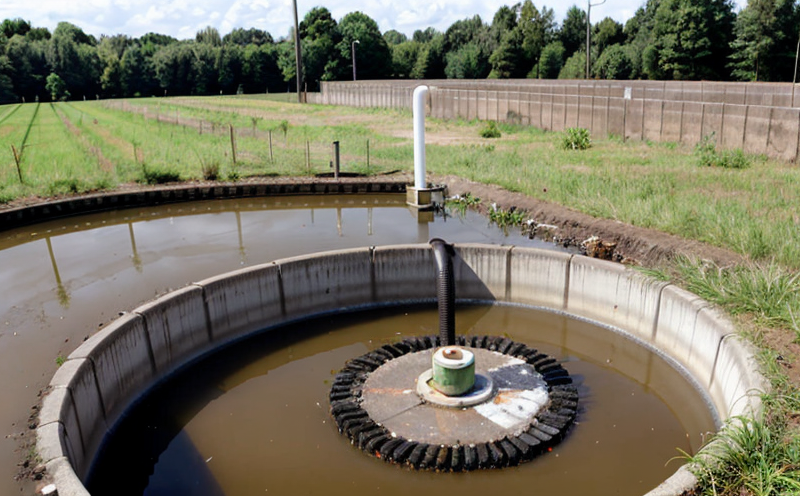ASTM D7573 Filterable Matter (TSS) Testing
The ASTM D7573 standard is a cornerstone in the wastewater and effluent testing sector, providing precise methodologies for measuring Total Suspended Solids (TSS). This test method is pivotal for industries that discharge treated water into regulated bodies of water. By quantifying the amount of suspended solids in wastewater before and after treatment, TSS measurements help compliance officers ensure that discharged effluents meet environmental regulations.
ASTM D7573 outlines a standardized procedure for collecting samples, filtering them through pre-weighed membranes, drying the collected solids under controlled conditions, and then reweighing to determine the mass of suspended particles. This method is particularly useful in identifying sources of pollution, optimizing treatment processes, and maintaining ecological balance.
For quality managers, this test is essential for validating the efficiency of wastewater treatment systems. By comparing pre-treatment and post-treatment TSS levels, they can assess the effectiveness of filtration methods and identify areas needing improvement. Compliance officers rely on accurate TSS data to ensure that their facilities are in compliance with local, national, and international standards.
R&D engineers benefit from ASTM D7573 testing by using it as a benchmark for developing new treatment technologies. By comparing the test results of various treatment methods, they can refine techniques to reduce TSS levels more efficiently. This is especially important for industries like paper mills, food processing plants, and pharmaceutical manufacturers, where even small reductions in suspended solids can have significant environmental impacts.
Procurement professionals also find value in ASTM D7573 testing when selecting vendors and suppliers. By specifying this test method as a criterion in their procurement contracts, they ensure that the quality of wastewater treatment services meets industry standards. This helps maintain consistent water quality across supply chains and supports sustainable business practices.
The precision and reliability provided by ASTM D7573 testing make it an indispensable tool for these professionals. It ensures that all parties involved in wastewater management are working towards common goals, which is critical for environmental protection and compliance with regulatory requirements.
Customer Impact and Satisfaction
The implementation of ASTM D7573 testing significantly enhances customer satisfaction by ensuring that discharged effluents meet stringent environmental standards. Quality managers can use the test results to demonstrate compliance with regulatory requirements, thereby protecting their reputation and avoiding potential penalties. Compliance officers are empowered to make informed decisions about treatment processes, leading to more effective waste management.
R&D engineers appreciate the standardized approach of ASTM D7573 as it provides a reliable benchmark for evaluating new technologies. This allows them to innovate confidently, knowing that their methods will be validated by an internationally recognized standard. Procurement professionals benefit from this testing method by ensuring consistent quality across suppliers, which ultimately leads to more sustainable and efficient operations.
By providing accurate and consistent TSS measurements, ASTM D7573 testing fosters trust between different stakeholders in the wastewater sector. This trust is crucial for maintaining long-term relationships and fostering a culture of environmental responsibility within industries that discharge treated water into natural ecosystems.
International Acceptance and Recognition
The ASTM D7573 standard enjoys widespread international acceptance, recognized by regulatory bodies worldwide. This recognition is critical for industries operating across multiple countries or those looking to expand internationally. Compliance with this standard ensures that the testing results are universally applicable and accepted.
Regulatory authorities in numerous jurisdictions have adopted ASTM D7573 as a primary method for TSS measurement due to its robustness and reliability. This adoption has led to greater consistency in wastewater treatment processes globally, facilitating cross-border collaboration and harmonization of environmental policies.
The standard's international recognition extends beyond regulatory compliance; it also contributes to the advancement of sustainable practices within industries. By adhering to ASTM D7573, companies can demonstrate their commitment to environmental responsibility on a global scale. This recognition enhances their reputation among stakeholders, including customers, investors, and the public.
Competitive Advantage and Market Impact
The implementation of ASTM D7573 testing provides significant competitive advantages for companies in the wastewater sector. By ensuring consistent and accurate TSS measurements, firms can demonstrate their commitment to environmental stewardship, which is increasingly important in today’s market.
Compliance with this standard allows businesses to meet regulatory requirements efficiently, reducing the risk of penalties and fines. This not only saves costs but also enhances the company's reputation as a responsible corporate citizen. In an era where sustainability is gaining prominence, such actions can differentiate companies from their competitors, attracting environmentally conscious customers.
Moreover, adherence to ASTM D7573 fosters innovation within industries by providing a standardized framework for evaluating new technologies and treatment methods. This encourages continuous improvement in wastewater management practices, leading to more efficient and effective solutions. As a result, companies can achieve higher operational efficiency while minimizing their environmental footprint.
The standard's global recognition also facilitates market expansion into regions with stringent environmental regulations. Companies that already comply with ASTM D7573 are better positioned to enter new markets without the need for additional certification processes. This reduces barriers to entry and allows businesses to capitalize on growing demand for sustainable products and services globally.





